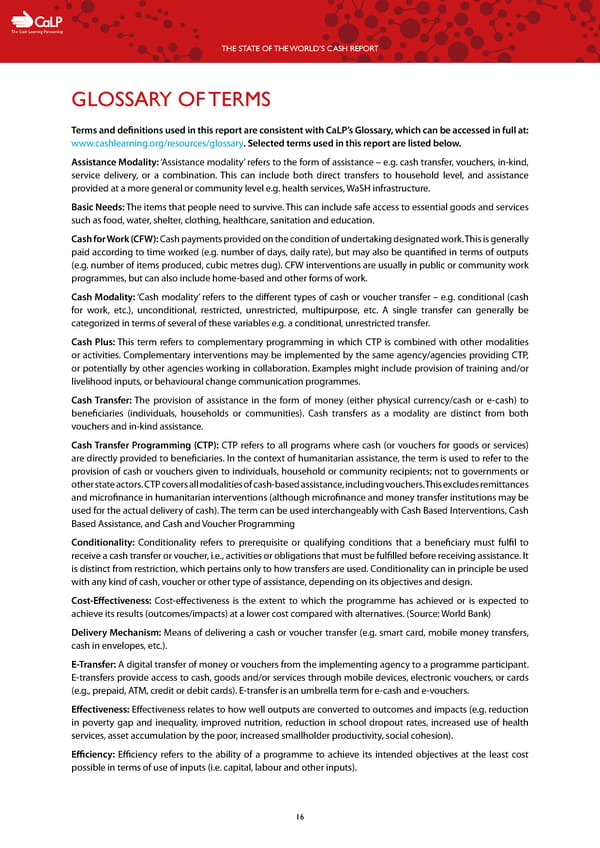C The Cash Learning Partnership THE STATE OF THE WORLD’S CASH REPORT GLOSSARY OF TERMS Terms and definitions used in this report are consistent with CaLP’s Glossary, which can be accessed in full at: www.cashlearning.org/resources/glossary. Selected terms used in this report are listed below. Assistance Modality: ‘Assistance modality’ refers to the form of assistance – e.g. cash transfer, vouchers, in-kind, service delivery, or a combination. This can include both direct transfers to household level, and assistance provided at a more general or community level e.g. health services, WaSH infrastructure. Basic Needs: The items that people need to survive. This can include safe access to essential goods and services such as food, water, shelter, clothing, healthcare, sanitation and education. Cash for Work (CFW): Cash payments provided on the condition of undertaking designated work. This is generally paid according to time worked (e.g. number of days, daily rate), but may also be quantified in terms of outputs (e.g. number of items produced, cubic metres dug). CFW interventions are usually in public or community work programmes, but can also include home-based and other forms of work. Cash Modality: ‘Cash modality’ refers to the different types of cash or voucher transfer – e.g. conditional (cash for work, etc.), unconditional, restricted, unrestricted, multipurpose, etc. A single transfer can generally be categorized in terms of several of these variables e.g. a conditional, unrestricted transfer. Cash Plus: This term refers to complementary programming in which CTP is combined with other modalities or activities. Complementary interventions may be implemented by the same agency/agencies providing CTP, or potentially by other agencies working in collaboration. Examples might include provision of training and/or livelihood inputs, or behavioural change communication programmes. Cash Transfer: The provision of assistance in the form of money (either physical currency/cash or e-cash) to beneficiaries (individuals, households or communities). Cash transfers as a modality are distinct from both vouchers and in-kind assistance. Cash Transfer Programming (CTP): CTP refers to all programs where cash (or vouchers for goods or services) are directly provided to beneficiaries. In the context of humanitarian assistance, the term is used to refer to the provision of cash or vouchers given to individuals, household or community recipients; not to governments or other state actors. CTP covers all modalities of cash-based assistance, including vouchers. This excludes remittances and microfinance in humanitarian interventions (although microfinance and money transfer institutions may be used for the actual delivery of cash). The term can be used interchangeably with Cash Based Interventions, Cash Based Assistance, and Cash and Voucher Programming Conditionality: Conditionality refers to prerequisite or qualifying conditions that a beneficiary must fulfil to receive a cash transfer or voucher, i.e., activities or obligations that must be fulfilled before receiving assistance. It is distinct from restriction, which pertains only to how transfers are used. Conditionality can in principle be used with any kind of cash, voucher or other type of assistance, depending on its objectives and design. Cost-Effectiveness: Cost-effectiveness is the extent to which the programme has achieved or is expected to achieve its results (outcomes/impacts) at a lower cost compared with alternatives. (Source: World Bank) Delivery Mechanism: Means of delivering a cash or voucher transfer (e.g. smart card, mobile money transfers, cash in envelopes, etc.). E-Transfer: A digital transfer of money or vouchers from the implementing agency to a programme participant. E-transfers provide access to cash, goods and/or services through mobile devices, electronic vouchers, or cards (e.g., prepaid, ATM, credit or debit cards). E-transfer is an umbrella term for e-cash and e-vouchers. Effectiveness: Effectiveness relates to how well outputs are converted to outcomes and impacts (e.g. reduction in poverty gap and inequality, improved nutrition, reduction in school dropout rates, increased use of health services, asset accumulation by the poor, increased smallholder productivity, social cohesion). Efficiency: Efficiency refers to the ability of a programme to achieve its intended objectives at the least cost possible in terms of use of inputs (i.e. capital, labour and other inputs). 16
 The State of the World's Cash | Full Report Page 17 Page 19
The State of the World's Cash | Full Report Page 17 Page 19